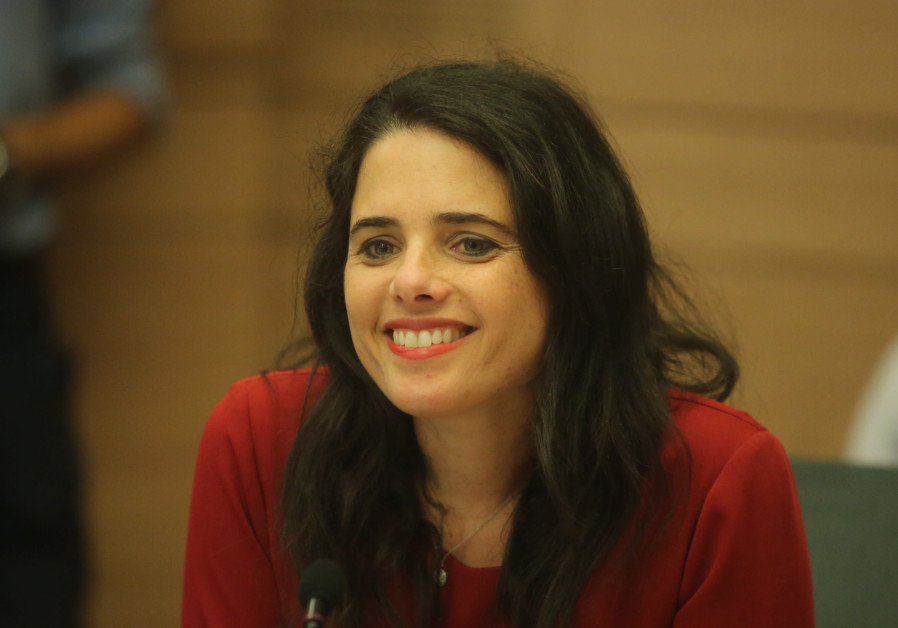Shaked to ‘Post’: November’s U.S. sanctions will hurt Iran a lot

Justice Minister Ayelet Shaked. (photo credit: MARC ISRAEL SELLEM)
The oil-related sanctions against Iran that are due to start on November 4 “will hurt it a lot,” Justice Minister Ayelet Shaked told The Jerusalem Post in a recent interview.
Shaked, who is part of the inner security cabinet, added that Israel is ready “to do everything” – code words for the use of force – to stop the Islamic Republic from obtaining a nuclear bomb if the sanctions are not enough.
Overall, she said it was important to wait and see what the impact of the November sanctions turn out to be.
But given that so many top current defense and economics experts have expressed doubt that sanctions can completely change Iranian behavior as long as it continues to have Chinese, Russian and other Asian countries’ support, she recalled that Israel always needs to be ready “to go toward other horizons.”
Moving to the Palestinian arena, Shaked was asked whether Bayit Yehudi will leave the government once the Trump administration peace plan is out, which the US president has clarified will include a commitment to the two-state solution.
“I don’t know what it will say,” she said. “This is all speculation. I am against a Palestinian state, not minus or plus. There will be elections in 2019. Whenever they are, we are the only right-wing party on the political map.
“Netanyahu will be prime minister. The question is whether his government will be to the Right or to the Left? Which partners will impact him the most? We are the only party that can move him to the Right. Kulanu, Yisrael Beytenu, Lapid and Zionist Union will all go Left. I hope we can increase our seats,” she said.
Pressed that both Trump and Netanyahu re-accepted the two-state solution as the basis of the soon expected US peace plan, Shaked implied that Bayit Yehudi would not need to leave the government simply because an idea it opposes is being discussed.
Rather, the point at which Bayit Yehudi would need to leave would be if a Palestinian state was actually being established – something she assumed was highly unlikely in any event.
In previous interviews with the Post, Shaked had proclaimed that there was and would be far more progress between Israel and moderate Sunni Arab states, even without a deal with the Palestinians, than people thought.
When it was noted that little had changed in the year since she made those statements, Shaked acknowledged that she “had hoped and still hoped for more direct relations” between Israel and the Sunni bloc, but that there was a new level of “productive cooperation in many areas” under the radar.
THE JUSTICE MINISTER specifically mentioned the fact that in March, Saudi Arabia had approved commercial airline flights by Israel through Saudi airspace for the first time.
Asked if she was also referring to the reported June meeting in Saudi Arabia between Mossad Director Yossi Cohen and Saudi intelligence chief Khalid bin Ali al-Humaidan, Shaked said, “I do not deal with Yossi Cohen’s visits, but defense cooperation is much better than it was before.”
Moving on to the security threats emanating from the Syria-Iran-Hezbollah access and Russia’s recent transfer of the S-300 antiaircraft missile system to the Assad regime, she said, “We will do what we did before.”
“We will not let Iran have a base in Syria… We will not let Hezbollah get precision weapons. With the S-300, we have more challenges and it is not good for Israel, but we will know how to deal with it,” she stated.
Asked if “dealing with” the S-300 challenge to Israeli aircraft being able to strike targets in Syria meant greater reliance on the F-35, which have capabilities for avoiding radar tracking, she demurred from getting specific, but reiterated, “We will continue to do what we must do.”
Shaked also addressed the question of how significant an impact the July Eritrea-Ethiopia peace deal would have on her ongoing efforts to get Israel’s Eritrean migrants to return to there.
At the time, Shaked said, “If as a result of the peace deal, the draft obligation is canceled, Israel can return the invaders to Eritrea and this is great news for the residents of southern Tel Aviv,” who have protested that most migrants have taken up residence in their neighborhood.
Confronted with the fact that months later the deal does not seem to have been an immediate game-changer – back in July human rights groups had said the deal might not make Eritrea safe to return to – she was circumspect.
“Now with the changed reality, we see if there can be a change. We are working on this now to arrive at an arrangement to send them back,” she said.
The justice minister also revealed that since the path to sending migrants back to Eritrea has not gone as smoothly as she and others may have expected – that the state is “in parallel also looking for other states” to which it can send the Eritreans.
She acknowledged that, “Until now other states have not sent [their Eritrean migrants] back to Eritrea,” but then added that Israel “could be the first.”
Join Jerusalem Post Premium Plus now for just $5 and upgrade your experience with an ads-free website and exclusive content. Click here>>






Comments are closed.